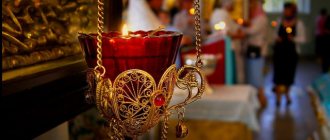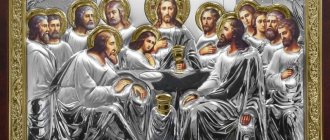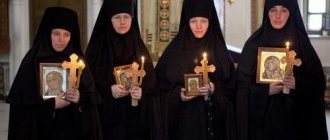The proclamation “Many Years” is a congratulatory prayer form used during patronal feasts. Every year these words are heard at church services. An ordinary person will say “Congratulations,” and an Orthodox person will say “It’s a lot of summer.” The literal translation of the phrase is “Many years.”
The difference between daily prayers and the proclamation “Many Years” lies in the fact that the latter text is sung at the service by an Orthodox choir. The parishioners repeat these words, congratulating each other.
Poems - One beauty for many years.
For many years, one beauty has been looking for a husband for herself. This one is short, that one is tall, the third one loves himself. This one is bald, that one is shaggy, this one is OK, but stingy, this one drinks, that one is fidgety, this one is cool, but married. This fat one, that bony one, a climber who wants to go to the mountains, This one with a sore, that one without money, get it out of your sight right away.
What should a poor beauty do? Where can she find a man? Suddenly there is a running line on the Russian channel: “We will help everyone, we will marry everyone, we will make all the people happy, Our computer is right there for your soul mate.
Features of church congratulations
Congratulations for a long and prosperous life are proclaimed by the deacon while his voice gradually strengthens and rises. In response, the kliros (church choir) repeatedly repeats the words “Many years!”
Since the adoption of Christianity in Rus', the hymn of many years has been performed in a long melodic chant. At the end of the 17th century, several polyphonic versions of this hymn appeared in the art of singing. There was also a one-voice version - a demestine chant. The works “Many Years” by Russian composers Dmitry Stepanovich Bortnyansky (1751-1825), Pyotr Ivanovich Turchaninov (1779-1856), Alexander Dmitrievich Kastilsky, 1856-1926) and others are widely known.
Poems - I have been looking for you for many years.
I have been looking for you for many years, I recognized your silhouette in the faceless crowd, but I lost it. You continued on your way, without leaving hope that we will meet someday
And so they accidentally collided, and the trembling of excitement could not be stopped. You and I didn't miss each other, love introduced us
I won’t be able to let you go. I won’t be able to wake up without you. There’s no point in living if you don’t want to stay.
You must believe me, You must know, For me, there is no one dearer to you, Only you, I will always wait.
The concept of many years
During Orthodox services, believers can hear the words of the chant “Many Years.” This is a kind of church congratulation, sounded during patronal holidays or other important events in the life of parishioners. In such cases, it is more common to hear “Congratulations” from secular people. The Orthodox use “Many years,” which literally means “Long summers (years).”
Orthodox worship
Orthodox calendar
Prophet Hosea (820 BC). Prmch. Andrei Kritsky (767).
St. Anthony of Leokhnovsky, Novgorod (1611). Mchch. the unmercenary Cosmas and Damian of Arabia and their martyr brothers. Leontia, Anthima and Eutropia (287 or 303). Transfer of relics of rights. Lazarus of the Four Days, bishop. Kitiysky (898).
Sschmchch. Neofita Lyubimov and Anatoly Ivanovsky presbyters, priests. Iakinfa Pitatelev and Callista Oparina (1918); sschmch. Alexandra, Archbishop Semipalatinsk (1937).
Icons of the Mother of God, called “Before Christmas and after Christmas the Virgin” (1827) and “Deliverer”.
Col., 253 credits, II, 1–7. Luke, 42, IX, 12–18.
Hello , dear TV viewers! Today, October 30, the Orthodox Church commemorates St. Anthony of Leokhnovsky, Novgorod .
Reverend Anthony of Leokhnovsky, Novgorod , was from the family of Tver boyars Veniaminov. The monk lived as a hermit not far from Novgorod, in the Rublevskaya Hermitage, on the Perekhod River. Around 1556 he moved to the hermit Tarasius, who lived beyond Lake Ilmen, on Leokhnov, not far from Staraya Russa, and took tonsure from him. This is how a desert monastery was established in honor of the Transfiguration of the Lord, later called the Leokhnovsky (or Ivetsky-Antoniyev) monastery. The Monk Anthony lived to a ripe old age, having acquired the gift of clairvoyance.
In 1611, when the Swedes ravaged the outskirts of Novgorod, the monk, at the call of Metropolitan Isidore, moved to Novgorod. He died on September 14, 1611 at the age of 85 and was buried near the church in the name of St. Luke the Evangelist on the Sofia side. Before his death, the monk said in the presence of many that his body would rest in his deserted monastery. The disciple of the Monk Gregory, returning to the site of the monastery destroyed and burned by the Swedes, set up a cell with a chapel and remained to live there. The Monk Anthony appeared to him three times in a dream and said: “Brother Gregory, go to Novgorod, tell Metropolitan Cyprian and the elders of the city to lay me in the place of my monastery.” After Gregory's message, the Metropolitan made a religious procession to the grave of St. Anthony. The found incorruptible relics were transferred to the Leokhnovsky monastery on July 13, 1620. When the relics of the saint were found, blind Joseph regained his sight and many more miracles took place.
The series of memories celebrated by the churches in the name of St. Anthony in the village of Leokhnovo (not far from Staraya Russa) and the Rublevskaya Hermitage is unique. On the second Friday after the feast of the Supreme Apostles Peter and Paul, the discovery and transfer of the relics of St. Anthony from Novgorod to the Leokhnovsky Monastery was remembered. On the Ascension of the Lord, the coming of the Monk Anthony from the Rublevskaya Hermitage to Leokhnovo was remembered. October 17, old style, commemorates the repose of the saint, who died on the Feast of the Exaltation of the Precious Cross. In the Rublevskaya hermitage, the memory of the consecration of the church in the name of St. Anthony was also celebrated - August 30, old style (1873).
Dear brothers and sisters, today is also celebrated
transfer of relics rights. Lazarus of the Four Days, bishop. Kitiysky (898);
and also the memory of the saints is celebrated:
prophet Hosea (820 BC);
prmch. Andrey Kritsky (767);
mchch. the unmercenary Cosmas and Damian of Arabia and their martyr brothers. Leontia, Anthima and Eutropia (287 or 303);
as well as new martyrs and confessors of the Russian Church:
sschmchch. Neofita Lyubimov and Anatoly Ivanovsky, presbyters, clergy. Iakinfa Pitatelev and Kallista Oparina (1918);
sschmch. Alexandra, Archbishop Semipalatinsk (1937);
A celebration is held in honor of the icons of the Mother of God, called “Before Christmas and after Christmas, the Virgin” (1827) and “Deliverer”.
To all who bear the names of saints glorified by the Church today, I heartily and warmly congratulate you on their namesake day! I wish you well from the Lord peace of mind, physical health and unfailing help from God through the prayers of your heavenly patrons! Be protected by God! Many happy summers to you!
Hieromonk Dimitri (Samoilov) , monk of the Holy Trinity Alexander Nevsky Lavra
Venerable Anthony of Leokhnovsky, Novgorod
Memorial Days: July 11, July 13 (Transfer of Relics), October 17
Reverend Anthony of Leokhnovsky, Novgorod, was The monk lived as a hermit not far from Novgorod, in the Rublevskaya Hermitage, on the Perekhod River. Around 1556 he moved to the hermit Tarasius, who lived beyond Lake Ilmen, on Leokhnov, not far from Staraya Russa, and took tonsure from him. This is how a desert monastery was set up in honor of the Transfiguration of the Lord, later called the Leokhnovsky, or Ivetsky-Antoniev, monastery. The Monk Anthony lived to a ripe old age, having acquired the gift of clairvoyance.
Prayer “Many Years” and its meaning
The proclamation “Many Years” is a congratulatory prayer form used during patronal feasts. Every year these words are heard at church services. An ordinary person will say “Congratulations,” and an Orthodox person will say “It’s a lot of summer.” The literal translation of the phrase is “Many years.”
The difference between daily prayers and the proclamation “Many Years” lies in the fact that the latter text is sung at the service by an Orthodox choir. The parishioners repeat these words, congratulating each other.
The history of the chant “Many Years”
According to the Jerusalem (6th century) and Studite (9th century) Rules, at the end of Vespers there is an exclamation:
“Ton despotin ke archierea imon Kyrie filatte is polla eti despota!”
Translated into Russian, this Greek phrase means:
“O Lord, preserve our lord and bishop for many years to come!”
Since the Byzantine time of church history (since the 10th century), these words of prayer for the primate (patriarch or ruling bishop) of the Russian Orthodox Church have been sung during services without translation.
In the 7th and 8th centuries, Western Christians began to add prayers wishing for the prosperity and health of ruling kings. It had the form: “To such and such (name of the king) life (vita)!”, or: “... life and victory! (vita et victoria!)”, “... health (salus) and life!”.
In the 10th century, the hymn of many years began to be used in Byzantium as a form of greeting to the emperor. Later it appeared in Russian Orthodoxy. Thus, in Russia, since the 18th century, longevity was sung to the emperor, empress, heirs to the throne, members of the Holy Synod, the diocesan bishop, the rector of the monastery with the brethren and all Orthodox Christians. So-called victorious long-term periods for victorious commanders were also drawn up. Currently, “Many Years” can also be sung to a specific person (for example, a birthday boy), or newlyweds.
In the practice of the Greek Church, longevity is now replaced by a blessing pronounced by the priest after the Liturgy:
“Save, Lord God, all the pious and Orthodox Christians who live in the city (village or island) and this enoria, with their wives and children.”
Congratulations on patronal holidays
A warm atmosphere is very important for wishing Merry Christmas. All parishioners are brothers and sisters, so we need to get together and enjoy every minute of the Nativity of Christ. It is also customary to congratulate people on the Intercession - the Lord welcomes such deeds, they are useful for the Orthodox soul. The exclamation “Many years” is intended for congratulations:
- parishioners;
- abbot of the monastery;
- priests;
- deacon.
Any priest will be pleased to hear the phrase “Many years.” In an official setting, the deacon is greeted with the words “Your Reverence,” and the archimandrite with the phrase “Your Reverence.” Many parishioners do not know this, so learn the set of church rules.
Many churches organize festive meals with the participation of priests and invited guests. All clergy are seated in order of seniority, with the dear guest being seated closer to the head of the table. Usually a service takes place, “Many Years” is sung, after which the guests retire to the parish refectory. This part of the event can include:
- Chairman of the Parish Council;
- altar boy;
- reader;
- acolyte;
- council members;
- singers;
- honored guests.
The prayer “Many Years” is also sung on a number of other solemn occasions. You can hear the text “Many Years” during bishop’s services and daily Vespers. For years, this chant has been addressed to clergy who glorify the Lord in churches. Among the Orthodox Greeks, in the southern land, the priest can greet the flock with these words. When congratulating you on Angel Day, the names of saints are mentioned. At the festive table, a troparion dedicated to a specific Orthodox name should be read.
Regardless of the year, the sacrament of marriage occupies a special place among Orthodox people. Christ the Son of God strongly encouraged marriages within the Christian church. The process of an Orthodox marriage may look like this:
- A church wedding ceremony is performed, during which the prayer “Many Years” is read.
- The newlyweds return to their father's house and are greeted with bread, salt and an icon.
- The best man collects money (the funds go to causes pleasing to the Lord).
- A feast is taking place, all toasts and congratulations should be spiritual (many years of marriage, responsibilities of spouses, love and building a truly Christian family).
An important point: the ceremony must be pious. Guests and newlyweds observe moderation in everything. To live many years of prosperity, you need to think about God and build a Christian, religiously observant family.
Performing a prayer by an Orthodox choir
Children's Orthodox choir
As you already understand, “Many Years” is performed by an Orthodox choir. The first fragment is a solo recitative. The deacon's voice becomes stronger gradually - this is achieved through long practice. The second part of the Many Years is taken over by the choir. At the same time, parishioners are not forbidden to quietly sing along if they know the words of the prayer and do not disturb those around them.
The choir is not a church choir in all cases. So, on the day of the Angel, a prayer is sung by the guests present at the celebration - they all unanimously praise the birthday boy. This usually happens at the end of the meal, when the hero of the occasion thanks the guests for their attention and sincere congratulations. As you can see, you will have to learn the words of this prayer in any case, since the text has important ritual significance.
We invite you to listen to the prayer “Many Years” performed by Alexander Torchilin and the choir of the St. Danilovsky Monastery:
Alexander Torchilin and the Festive male choir of the Moscow Danilovsky Monastery. Many years
Examples of many years
Examples of longevity can be found in the book of theologian Hermogenes Ivanovich Shimansky (1915-1970) “Liturgics: Sacraments and Rites.” A manual on the proclamation of special deaconal exclamations, “The Deacon’s Companion,” compiled by Archpriest Alexander Sorokin, will also help.
“Many years” to the Patriarch
Grant a prosperous and peaceful life, health and salvation, and good haste in everything, O Lord, to our Great Lord and Father (name), His Holiness the Patriarch of Moscow and All Rus', (and the Holy Trinity Lavra of St. Sergius to the Holy Archimandrite) with his God-saved all-Russian flock, and keep it for many years.
Many years on statutory holidays
To the Great Lord and Our Father (name), His Holiness Patriarch of Moscow and All Rus', (and the Holy Trinity Lavra of St. Sergius, Holy Archimandrite) and to our Most Reverend Lord (name), Metropolitan of St. Petersburg and Ladoga, (Holy Trinity Alexander Nevsky Lavra, Holy Archimandrite) and many years to come to this consecrated cathedral!
May our God-protected country, its authorities, its army and its people live many years!
To the All-Honorable (Father) Rector, brethren, (singing) and parishioners of this holy temple, (to all) standing and praying here and to all Orthodox Christians - many years to come!
Many years for a specific person
Grant, O Lord, a prosperous and peaceful life, health and salvation, and good haste in everything, (and an abundance of earthly fruits) to (name), and preserve him (her) for MANY YEARS!
“Many summers” for newlyweds
Grant, O Lord, a prosperous and peaceful life, health and salvation and good haste in everything, mutual love and harmony, and an abundance of earthly fruits to the newlyweds (names) and preserve them for many years!
Many years after the rite of consecration of the house
A prosperous and peaceful life, health and salvation, and good haste in everything, mutual love and harmony, and an abundance of earthly fruits, grant, O Lord, to all Your faithful who want to live (or live) in this house (and to all who stand and pray) , and save them for many years!
Read us conveniently on social networks:
Tags: long summer, many happy years, congratulations, many years, many years, congratulations










